- Home
- Cecelia Ahern
How to Fall in Love Page 2
How to Fall in Love Read online
Page 2
I finally found what I was looking for on the shelf. Six Tips on How to Fire an Employee (With Pictures).
I’m not sure the pictures helped, but I’d had a go at standing in front of the bathroom mirror and trying to emulate the concerned look on the employer’s face. I studied the notes I’d made on a Post-it inside the front page, unsure whether I was going to be able to do this. My company, Rose Recruitment, had been in operation for four years and was a small practice of four people, and our secretary Gemma helped us function. I didn’t want to let her go, but due to increasing personal financial pressures I was having to consider it. I was reading my notes when there was a knock on the door, quickly followed by Gemma’s entry.
‘Gemma,’ I squeaked, fumbling guiltily with the book in an effort to hide it from her. As I was stuffing it into an already crammed shelf, I lost my grip and sent it plummeting to the floor, where it landed at Gemma’s feet.
Gemma giggled and bent down to pick up the book. Noting the title, she flushed. She looked at me, surprise, dread, confusion and hurt all passing on her face. I opened and closed my mouth, no words coming out, trying to remember which order the book had told me to break the news, the correct phrasing, the correct facial expressions, the tips, clarity, empathy, not too emotional, communicate with candour or without candour? But it took me too long and by then she already knew.
‘Well, finally one of your stupid books worked,’ Gemma said, her eyes filling as she dumped the book in my arms and turned, grabbed her bag and stormed out of the office.
Mortified, I couldn’t help but be insulted by the emphasis on finally. I lived by these books. They worked.
‘Maguire,’ the unwelcoming voice barked down the phone.
‘Detective Maguire, it’s Christine Rose.’ I put a finger in my free ear to block the sound of the ringing phone wailing through the wall from reception. Gemma still hadn’t returned after storming out, and as I hadn’t been able to bring everybody together to work out how to share Gemma’s duties, my colleagues Peter and Paul were refusing to do the job of someone who had been unfairly dismissed. It was everyone against me, regardless how many times I told them it had been a mistake. ‘I didn’t mean to fire her … today’ was not a good defence.
It was quite simply a disastrous morning. But although it was obvious I needed to keep Gemma on – something I was sure Gemma was trying to prove – my bank balance disagreed. I still had to pay half the mortgage on the home Barry and I owned together, and from that month on I would have to fork out an extra six hundred euro to rent a one-bedroom apartment while I waited for us to sort it all out. Considering we’d have to sell an apartment that nobody wanted, for an eventual price that neither of us could really survive on, I imagined I would be digging into my savings for a very long time. And even in the event desperate times called for desperate measures, Barry had already waged a war on my jewellery collection, taking every piece he had ever given me and keeping it for himself. That was the voicemail I’d woken up to that morning.
‘Yeah?’ was Maguire’s response, far from ecstatic to hear from me, though I was surprised he remembered my name.
‘I’ve been calling you for two weeks. I’ve left you messages.’
‘I got them all right, they clogged up my voicemail. There’s no need to panic. You’re not in any trouble.’
That knocked me off. It hadn’t crossed my mind that I would be in any trouble. ‘That’s not why I was calling.’
‘No?’ he feigned surprise. ‘Because you still haven’t explained to me what you were doing in a deserted apartment block on private property at eleven o’clock at night.’
I was silent as I mulled this over. Almost everybody I knew had asked me the same thing, those who hadn’t were clearly wondering about it, and I hadn’t given anybody an answer. I needed to change the subject quickly before he tried to pin me down on it again.
‘I had been calling to ask for further details on Simon Conway. I wanted to know the funeral arrangements. I couldn’t find anything in the papers. But that was two weeks ago, so I’ve missed it.’ I tried to keep the irritation out of my voice. I was calling him for more information, Simon had left an enormous hole in my life and endless questions in my head. I couldn’t rest without knowing everything that had happened and had been said after that day, I wanted his family’s details so I could tell them all the beautiful things he’d said about them, how he loved them so much and how his actions had nothing to do with them. I wanted to look them in the eye and tell them I had done all that I could. To ease their pain or ease my guilt? What was wrong with wanting both? I didn’t want to sound so desperate as to ask Maguire those exact questions, and I knew he wouldn’t tell me anyway, but I couldn’t just draw a line under what I had experienced. I wanted, I needed more.
‘Two things. Firstly, you shouldn’t get so involved with any victim. I’ve been in this game a long time and—’
‘Game? I watched a man shoot himself in the head right before my very eyes. This is not a game to me.’ My voice cracked, which I took as a hint to stop.
There was silence. I cringed and covered my face. I’d blown it. I gathered myself and cleared my throat. ‘Hello?’
I waited for a smart response, something cynical and cold, but it didn’t come. Instead his voice was soft, the background wherever he was had gone quiet and I was worried everyone had stopped to listen to me.
‘You know we have people in here to talk to after an event like this,’ he said, gently for once. ‘I told you that night. I gave you a card. Do you still have it?’
‘I don’t need to talk to anyone,’ I said angrily.
‘Sure.’ He dropped the nice-guy act. ‘Look, as I was saying before you interrupted me, there are no funeral details. There was no funeral. I don’t know where you got your information but they’ve been telling you porkies.’
‘What do you mean?’
‘Porky pies, lies.’
‘No, what do you mean, there was no funeral?’
He sounded exasperated at having to explain something that was glaringly obvious to him. ‘He didn’t die. Yet, anyway. He’s in hospital. I’ll find out where. I’ll put a call through to them to let them know you’re able to see him. He’s in a coma though, won’t be doing much talking.’
I froze, speechless.
There was a long silence.
‘Is there anything else?’ He was on the move again, I heard a door bang and then he was back to the room with the loud voices.
I struggled to formulate a single thought as I slowly sank into my armchair.
And sometimes when you witness a miracle it makes you believe that anything is possible.
3
How to Recognise a Miracle and What to Do When You Have
The room was still and quiet, the only sounds were the steady beeping of Simon’s heart monitor and the whoosh of the ventilator as it assisted his breathing. Simon was the polar opposite of how I’d last seen him. Now he looked peaceful, the right side of his face and head bandaged, the left side serene and smooth as if nothing had happened. I chose to sit on his left side.
‘I saw him shoot himself,’ I whispered to Angela, the nurse on call. ‘He held a gun up right here,’ I gestured, ‘And pulled the trigger. I saw his – everything – go everywhere … how did he survive?’
Angela smiled, a sad smile, not really a smile at all, just muscles working around her lips. ‘A miracle?’
‘What kind of a miracle is that?’ I continued to whisper, not wanting Simon to hear me. ‘I keep going over it, over and over in my head.’ I’d been reading books about suicide and what I should have said, and they say that if you can get a person threatening suicide to think rationally, if they actually think about the realities of suicide and its aftermath, then they could, they might abort the decision. What they’re looking for is a quick fix to end the emotional pain, not to end their lives, so if you can help them see another way to ease the pain then maybe you could help. ‘I think, cons
idering I had no experience, that I did okay, I think I really got through to him. I think he really responded to me. For a moment, anyway. I mean, he put the gun down. He let me call the guards. I just don’t know what it was that sent him back into that head space.’
Angela frowned as though hearing or seeing something she didn’t like. ‘You know this isn’t your fault, don’t you?’
‘Yeah, I know.’ I shrugged it off.
She studied me, thoughtful, and I concentrated on the right wheel of the hospital bed, how it caused a black scuff mark when it was moved each time, lots of scuff marks back and forth, and I tried to count how many times it had been moved. Dozens, at least.
‘You know there are people you can talk to about this kind of thing. It would be a good idea to get your concerns out.’
‘Why does everyone keep saying that?’ I laughed, trying to sound carefree but deep down feeling the anger burning my chest. I was tired of being analysed, tired of people treating me as though I was someone who needed to be handled. ‘I’m fine.’
‘I’ll leave you with him for a while.’ Angela stepped away, her white shoes silent on the floor as if she was floating.
Now that I had come, I didn’t quite know what to do. I reached out for his hand but then stopped myself. If he was aware, perhaps he would not want me to touch him, maybe he blamed me for what had happened. It had been my job to stop him and I hadn’t. Perhaps he had wanted me to change his mind, he was willing me to say the right words but I’d failed him. I cleared my throat, looked around to make sure no one was listening and I leaned in closer to his left ear but not so close as to startle him.
‘Hi, Simon,’ I whispered.
I watched him for a reaction. Nothing.
‘My name is Christine Rose, I’m the woman you spoke to on the night of … the incident. I hope you don’t mind my sitting with you for a while.’
I listened for something, anything, and studied his face and hands for signs that he was upset by my presence. I didn’t want to cause him any more pain. When all on the surface remained as it was, calm and still, I sat back in the chair and got comfortable. I wasn’t waiting for him to wake up, I didn’t have anything I wanted to say to him, I just liked being there, in the silence, by his side. Because when I was by his side I wouldn’t be anywhere else, wondering about him.
At nine p.m., after visiting hours, I still hadn’t been asked to leave. I guessed regular hours didn’t count for someone in a condition such as Simon’s. He was in a coma, on a life-support machine, and his condition wasn’t improving. I spent the time thinking about my life and Simon’s and how our coming together had irrevocably changed both of our lives. It had only been a few weeks since Simon’s attempted suicide, but it had sent my life spiralling in another direction. I wondered if it was pure coincidence or if me being in that random place had been fate.
‘What were you doing there?’ Barry had asked me, confused, sleepy, sitting up in bed with his scrunched-up face, his tiny eyes enormous after he’d reached for his black-rimmed glasses on the bedside chest and put them on. I hadn’t known how to answer him then; I wouldn’t know how to answer him now. To say it out loud would be embarrassing, it would highlight how ludicrously lost I had found myself – the irony of that statement not lost on me.
Aside from what I was doing there, the fact I’d chosen to engage with a man with a gun in a deserted building was enough to cause me to question myself. I liked to help people but I wasn’t sure it was just about that. I saw myself as a problem-solver and I applied that thinking to most aspects of life. If something couldn’t be fixed, it could at least be changed, particularly behaviour. My belief system was born of having a father who was a fixer. It was in his nature to ask the problem and then set about fixing it as he did for his three girls growing up without their mother. Because he lacked Mum’s instinct to know if things were right with us or not and he had no one else to discuss it with, he would question us, listen to the answer, then seek out the solution. It was his way and it was what he felt he could do for us. Left with three children under the age of ten, the youngest only four years of age, a father does what he can to protect his children.
I run my own recruitment agency, which sounds basic enough, only I prefer to think of myself as a match maker, finding the right person for the right job. It’s important to bring the right energy for the right company, and vice versa, what the company can do for a person. Sometimes it’s just mathematics, an available job for an available person with the appropriate skills; other times, when I get to know the person, like Oscar, I really go beyond the call of duty when it comes to placing them. The people I deal with have different emotions about their goals, some because they’ve lost their jobs and are under great stress, others simply fancy a career change and are anxious but full of happy expectation, and then there are the ones who are stepping into the workplace for the first time, excited about new beginnings. Regardless, everyone’s on a journey, and I’m in the middle of that. I’ve always felt the same responsibility for each of them – to help people find the right place in the world. And yet, using that philosophy, my words had landed Simon Conway in this room.
I didn’t want to leave him alone, and returning to a borrowed flat with no television and nothing to do but stare at the four walls did not appeal to me. I had many friends who I could have stayed with, but as they were mutual friends of mine and Barry’s, they were slow to offer, reluctant to get in the middle of the mess, to be seen to be taking sides, especially when it was me that was coming out looking like the bad one, the big bad wolf who’d broken Barry’s heart. It was better for me not to put them through that stress. Brenda had invited me to come and stay with her, but I couldn’t put up with my sister fretting about my supposed post-traumatic stress disorder. I needed to come and go as I pleased without any questions being asked, especially ones about my sanity. I wanted to feel free – that’s why I’d left my marriage in the first place. The fact that I felt more at home in an intensive care unit than I did anywhere else said a lot.
So here was the thing I couldn’t tell Detective Maguire, or Barry, or my dad and two sisters, or anybody, really. There was a specific place I was trying to find to make me feel better about myself. I learned this from a book: How to Live in Your Happy Place. The idea was to choose a place that made you feel uplifted. It could be somewhere you connected with a memory that enriched your soul or simply a place where you liked the light, or a place that made you feel content for a reason you couldn’t recognise on a conscious level. Once you found that place, the book offered exercises to help you summon the same happy feeling you associated with that place absolutely any time and anywhere your heart desired, but it would only work if you had found the right place. I’d been looking. It’s what I was doing on the building site the night I met Simon Conway. It wasn’t the building site I was looking for, it was what used to be there before it became a building site. I had a happy memory there on that land.
It was a cricket match, Clontarf versus Saggart. I was five years old and Mum had died only a few months before and I remember it was a sunny day, the first after a long dark cold winter, and me and my sisters were there to watch Dad play. The entire cricket club was outside, I remember the smell of beer, and I can taste the saltiness on my lips from the packets of peanuts I was consuming one after another. Dad was bowling and it was close to the end of the match; I could see the intense look on his face, the look we’d been seeing every day for the past few weeks, the dark look with his eyes practically lost beneath his eyebrows. He went for his third bowl and the guy batting completely misjudged his swing and missed. The ball hit the wicket and the guy was out. Dad yelled so loudly and punched the air with such ferocity, everyone around us erupted in cheers. It frightened me at first, watching the mass hysteria, like they’d all caught some weird virus that I’d seen in a zombie movie and I was the only one who hadn’t been affected, but then as I watched Dad’s face I knew that it was okay. He was wearing the bi
ggest smile, and I remember the looks on my sisters’ faces. They weren’t too bothered about cricket either – in fact they’d moaned the entire way over in the car because they were being taken away from playing with their friends on the road – but they were watching him celebrating, being lifted on to his team mates’ shoulders, and they were smiling and I remember that was the moment I thought – we’re going to be okay.
I went to the development to get that feeling again, but when I got there I saw a ghost estate and I met Simon.
When I left Simon at the hospital that night I continued on my quest to find places that uplifted me. I’d been doing it for about six weeks by that stage and I’d already been to my old primary school, a basketball court where I’d kissed a boy I believed was way out of my league, my college, my grandparents’ house, the garden centre I used to go to with my grandparents, the local park, the tennis club where I spent my summers, and various other haunts that had been the location of good memories. I’d randomly dropped in on an old primary school friend’s house and proceeded to have the most awkward conversation I’ve ever had, and immediately wished I hadn’t bothered going. I had visited her because when I was passing I had a sudden memory: the hot warm sweet smell of baking in her kitchen. Every time I played there, her mother seemed to be baking. Twenty-four years on, the baking smell was gone, so was her mother, and in its place were my exhausted old friend’s two children, who were using her as a climbing frame and wouldn’t give us a second to talk, which was a blessing as we had nothing to say to one another anyway above the silent question on her lips: Why the hell did you come here? We weren’t even that close. Assuming I was going through something, she was polite enough not to say it out loud.
For the first few weeks, not finding my place didn’t bother me, the searching was a way of passing my time, but after three weeks my inability to find my place started to prey on my mind. Instead of re-energising me, it was in fact undoing the good memories that I had.

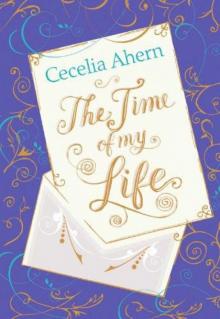 The Time of My Life
The Time of My Life Lyrebird
Lyrebird Girl in the Mirror
Girl in the Mirror Perfect
Perfect One Hundred Names
One Hundred Names PS, I Love You
PS, I Love You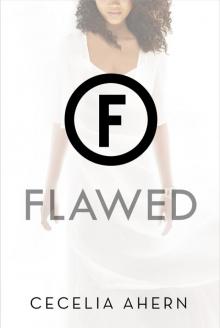 Flawed
Flawed The Book of Tomorrow
The Book of Tomorrow Love, Rosie
Love, Rosie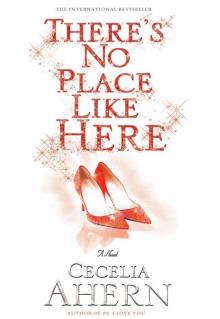 A Place Called Here
A Place Called Here How to Fall in Love
How to Fall in Love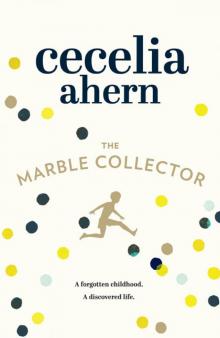 The Marble Collector
The Marble Collector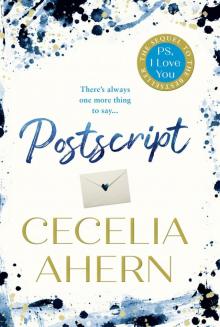 Postscript
Postscript The Gift
The Gift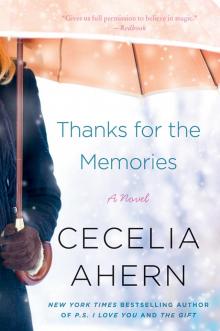 Thanks for the Memories
Thanks for the Memories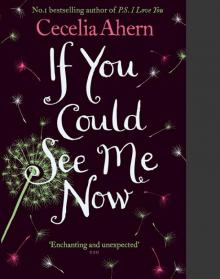 If You Could See Me Now
If You Could See Me Now Roar
Roar Cecelia Ahern 2-book Bundle
Cecelia Ahern 2-book Bundle Girl in the Mirror: Two Stories
Girl in the Mirror: Two Stories PS, I Love You: A Novel
PS, I Love You: A Novel Cecelia Ahern Short Stories
Cecelia Ahern Short Stories There’s No Place Like Here
There’s No Place Like Here